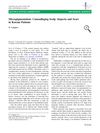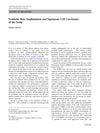TLDR A man developed skin cancer on his scalp after multiple artificial hair grafts.
The document describes a 74-year-old male patient who developed squamous cell carcinoma (SCC) of the scalp following multiple synthetic hair grafts for androgenic alopecia over a period of 20 years. The patient had experienced recurrent inflammation and infections at the graft sites, which may have contributed to the development of the carcinoma. After presenting with an ulcerated lesion, the SCC was surgically removed, and the patient underwent bone excision and scalp reconstruction, with no recurrence observed 6 months after surgery. The case raises concerns about the potential risks of artificial hair implantation, including neoplastic degeneration due to chronic irritation and microtrauma, and underscores the need for more scientific research to establish the safety of these procedures.
 14 citations
,
September 2010 in “Annals of Plastic Surgery”
14 citations
,
September 2010 in “Annals of Plastic Surgery” Hair restoration has evolved from surgery to drugs to potential gene therapy, with improved results and ongoing research driven by high demand.
 10 citations
,
January 2010 in “International Journal of Trichology”
10 citations
,
January 2010 in “International Journal of Trichology” Synthetic hair fibers for hair restoration were controversial in 2009 due to health risks and lack of support from the International Society of Hair Restoration.
 9 citations
,
November 2008 in “Journal of Cosmetic Dermatology”
9 citations
,
November 2008 in “Journal of Cosmetic Dermatology” Artificial hair implantation is generally safe and can restore hair when other treatments fail, but some patients may experience side effects.
 10 citations
,
January 2007 in “Dermatologic Surgery”
10 citations
,
January 2007 in “Dermatologic Surgery” Artificial hair fibers help treat scalp scars with few complications and a 20% yearly fiber fall rate.
 20 citations
,
January 1979 in “JAMA”
20 citations
,
January 1979 in “JAMA” Fiber implantation for baldness is not recommended because it causes many problems and doesn't work well.
 1 citations
,
January 2014 in “Aesthetic Plastic Surgery”
1 citations
,
January 2014 in “Aesthetic Plastic Surgery” Tattooing improves appearance of scalp alopecia and scars.
 2 citations
,
August 2012 in “Aesthetic Plastic Surgery”
2 citations
,
August 2012 in “Aesthetic Plastic Surgery” The letter argues that blaming synthetic hair implants for scalp cancer based on one report is biased and possibly coincidental.







